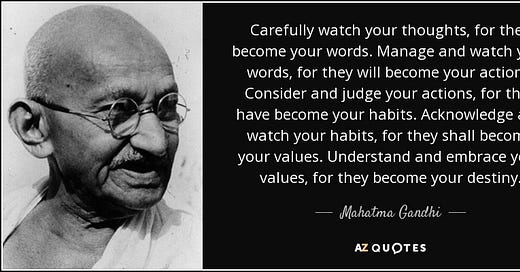In this issue: What’s Your Story… / ‘The Power of Regret’ / Get Comfortable with Feeling Uncomfortable / The Lighter Side of Stories
—
Why you’re getting this:
I'm Andrea J. Miller and this is my “On Leading Well” Newsletter. I send this to people in my networks, people I’ve met recently, and friends I want to keep in touch with. You can unsubscribe (SEE THE VERY BOTTOM OF THE EMAIL) anytime, I won’t be offended
—
What’s Your Story …the Value of Choosing the Right Narrative for Life
Every day you create stories.
They influence your choices.
I’m healthy = eat an apple
Just this once = a pint Ben & Jerry’s
I can do this = go for the promotion
I’m not ready = wait until…
Often, these decisions are unconscious.
They feel right at the moment.
Sometimes they don’t.
It’s not easy.
In fact, at times it’s just plain hard...
And scary.
That’s when the change happens.
At least that was my experience
Turning the Page
Five difficult years.
Three surgeries.
The deaths of both parents…
And a whole lot of metal and pain.
There were days that I wanted to give up, stay in bed and have a great big pity party.
It all felt too difficult and too much.
But on some level, I knew I had a choice.
A choice that I continue to make every day, sometimes multiple times a day...and, if I’m being honest, sometimes not.
Everything that happened, happened.
Those pages are written.
One day I realized that re-reading them over and over again, wasn’t going to change anything.
In fact, it was making it worse
Inevitably I knew I had to choose a different story.
The Better Narrative
Life can often feel like it comes in chapters.
…and some are (much) better written than others (not unlike this sentence :).
At times, you may even feel like you’ve had a few unexpected guest writers and crazy plot twists.
But in the end, it’s still your story.
You can choose to edit it, pick a better narrative and create a masterpiece.
It won’t be easy.
Changing thinking and related habits is hard.
If it were easy, well, you probably wouldn’t be reading this...
As James Clear discusses in his bestselling book, Atomic Habits, it all begins with identity.
The less-than-optimal choices you were making in your story were in line with the image of the person you believed yourself to be (either consciously or subconsciously).
As you do your re-writes …
Ask yourself, who would you rather be the hero or the villain?
It’s your choice.
Creating Your Masterpiece
1. Better Dialogue – our inner and outer dialogue matters. You internalize your thinking and inevitably it becomes your actions. When you talk to yourself in unhelpful ways and choose to ruminate over unhelpful things for too long it can create a narrative that doesn’t work for the story you want to create.
2. Character Selection – while stories usually have a central character, they’re never about one person. Who’s in your story. Are they helping or hurting you create your masterpiece? If not, ask yourself why? Are they antagonists? Or maybe they just don’t know the role their character needs to play. How can the characters in your story help you to achieve your goal(s)?
3. Editorial Assistance – good stories are almost never written on the first go and, inevitably there’s an editor behind the scenes who helps the writer create better structure and dialogue. Consider seeking outside help to improve the quality of your story, whether that’s one of the other characters or a “writing” coach, an outside view can help you see the things you might miss…who knows, it may just end up being a bestseller!
—
RECOMMENDED READS or Listens
‘The Power of Regret’ by Daniel Pink argues that looking back is good for you – a brief write-up about Daniel Pink’s fascinating new book…how we may have gotten regret all wrong.
Get Comfortable with Feeling Uncomfortable – from the brilliant psychologist Ayelet Fishbach. We often try to avoid discomfort, when in fact, moderate emotional discomfort is a signal that you’re developing as a person, and it often happens before you can detect the benefits of self-growth.
—
The Lighter Side of Stories





